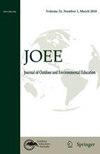Measuring nature-based health interventions – a rapid review of instrumentation and outcomes
IF 1.4
Q3 EDUCATION & EDUCATIONAL RESEARCH
引用次数: 0
Abstract
Abstract Nature-based health interventions (NBHIs) are utilised to treat a range of physical and mental health conditions, and this rapid review sought to describe the breadth of instrumentation utilised to measure the effectiveness of NBHIs on the different domains of health and wellbeing. A total of 14,385 records were extracted from three databases, and a review of titles and abstracts and then of full text resulted in a final dataset of 167 articles that met the review criteria. NBHI settings were categorised as Garden/Horticulture, Blue Spaces, Urban Green Spaces, Wild Nature, and Camps/Residential. For each of these settings, major population groups included in the studies, health domains and outcomes addressed, as well as assessment tools used to measure NBHIs’ effectiveness were described and analysed in aggregate. A total of 336 measurement tools were utilised across the dataset, with only 29 being specifically designed to assess NBHIs. Most studies investigated mental health domains and measured the effectiveness of NBHIs to improve psychological factors and physical, behavioural, and healthy eating outcomes. Future research should interrogate how nature-based tools and outcome measurements could be used most effectively in NBHI settings.衡量基于自然的卫生干预措施——对手段和结果的快速审查
基于自然的健康干预(NBHIs)用于治疗一系列身心健康状况,本快速综述试图描述用于测量NBHIs在不同健康和福祉领域有效性的仪器的广度。从三个数据库中共提取了14,385条记录,并对标题和摘要进行了审查,然后对全文进行了审查,最终得出167篇文章的数据集符合审查标准。nhi设置分为花园/园艺、蓝色空间、城市绿地、野生自然和营地/住宅。对于每一种情况,研究中包括的主要人口群体、涉及的健康领域和结果,以及用于衡量国家卫生保健服务有效性的评估工具都进行了总体描述和分析。整个数据集共使用了336种测量工具,其中只有29种是专门设计用于评估NBHIs的。大多数研究调查了心理健康领域,并测量了NBHIs在改善心理因素、身体、行为和健康饮食结果方面的有效性。未来的研究应该探究基于自然的工具和结果测量方法如何能最有效地应用于nhi。
本文章由计算机程序翻译,如有差异,请以英文原文为准。
求助全文
约1分钟内获得全文
求助全文
来源期刊

Journal of Outdoor and Environmental Education
Social Sciences-Education
CiteScore
2.60
自引率
35.00%
发文量
28
期刊介绍:
The Journal of Outdoor and Environmental Education (JOEE) is a double-blind peer-reviewed journal devoted to the scholarly examination of issues in outdoor and environmental education. JOEE provides a forum in which outdoor and environmental education professionals from all settings can exchange and discuss ideas and practices relevant to their work.JOEE invites submissions of papers of between 4000 and 8000 words (including reference list and abstract) that focus on enhancing understanding of outdoor and environmental education issues through balanced and in-depth investigation of practices and theories relevant to outdoor and environmental education. Shorter book/document reviews are also welcomed.JOEE does not privilege any particular methodology or theory and welcomes contributions from various standpoints. However, editorial will prioritise papers that take into consideration a broad readership which includes teachers and other practitioners as well as researchers, requiring authors to express and explain evidence and theory using language that is accessible to readers beyond a particular community. With this in mind, we ask authors, on acceptance of their paper, to produce a short video which will be made accessible in order to share the main messages contained in their paper with a wide audience.
 求助内容:
求助内容: 应助结果提醒方式:
应助结果提醒方式:


